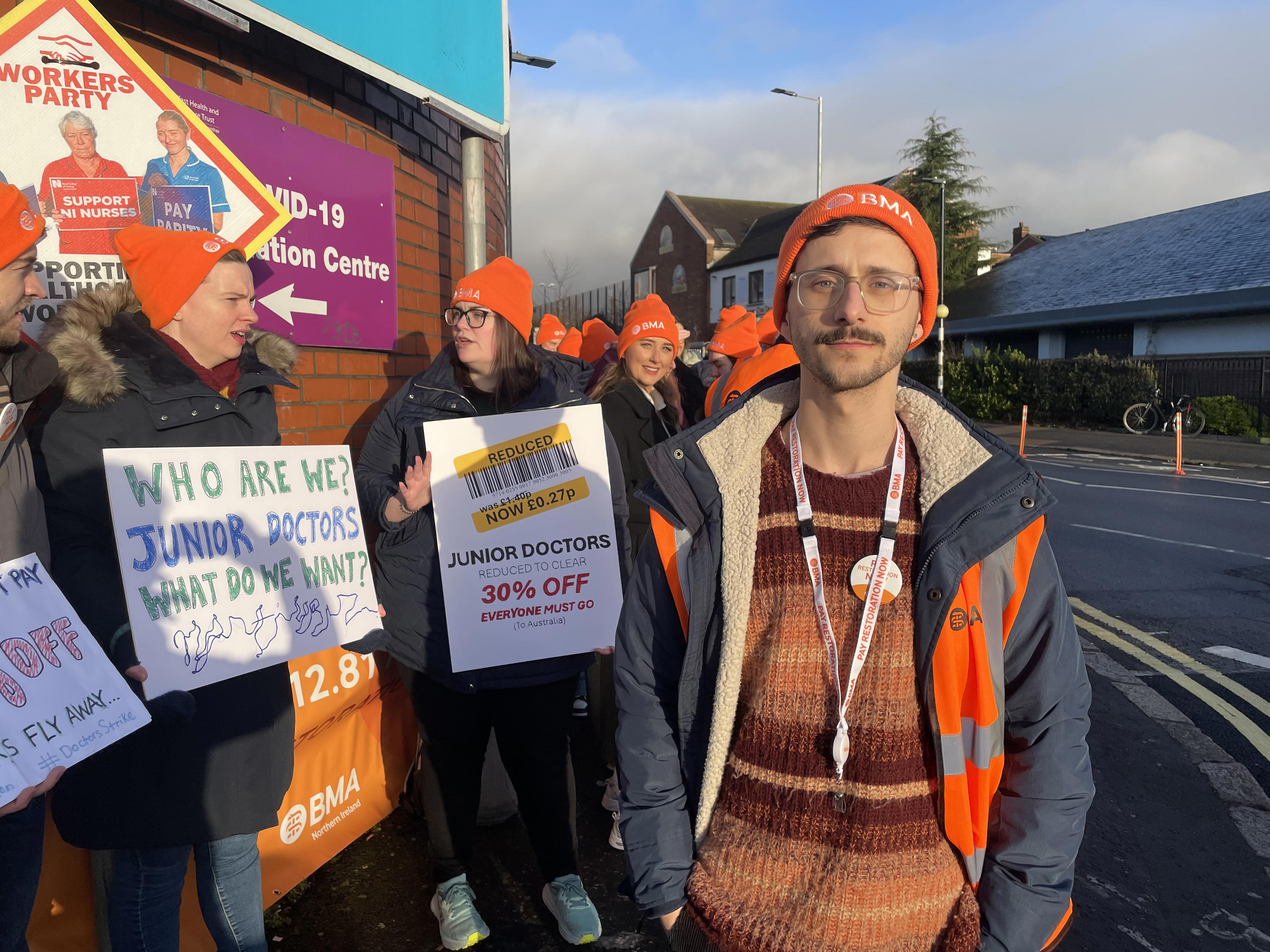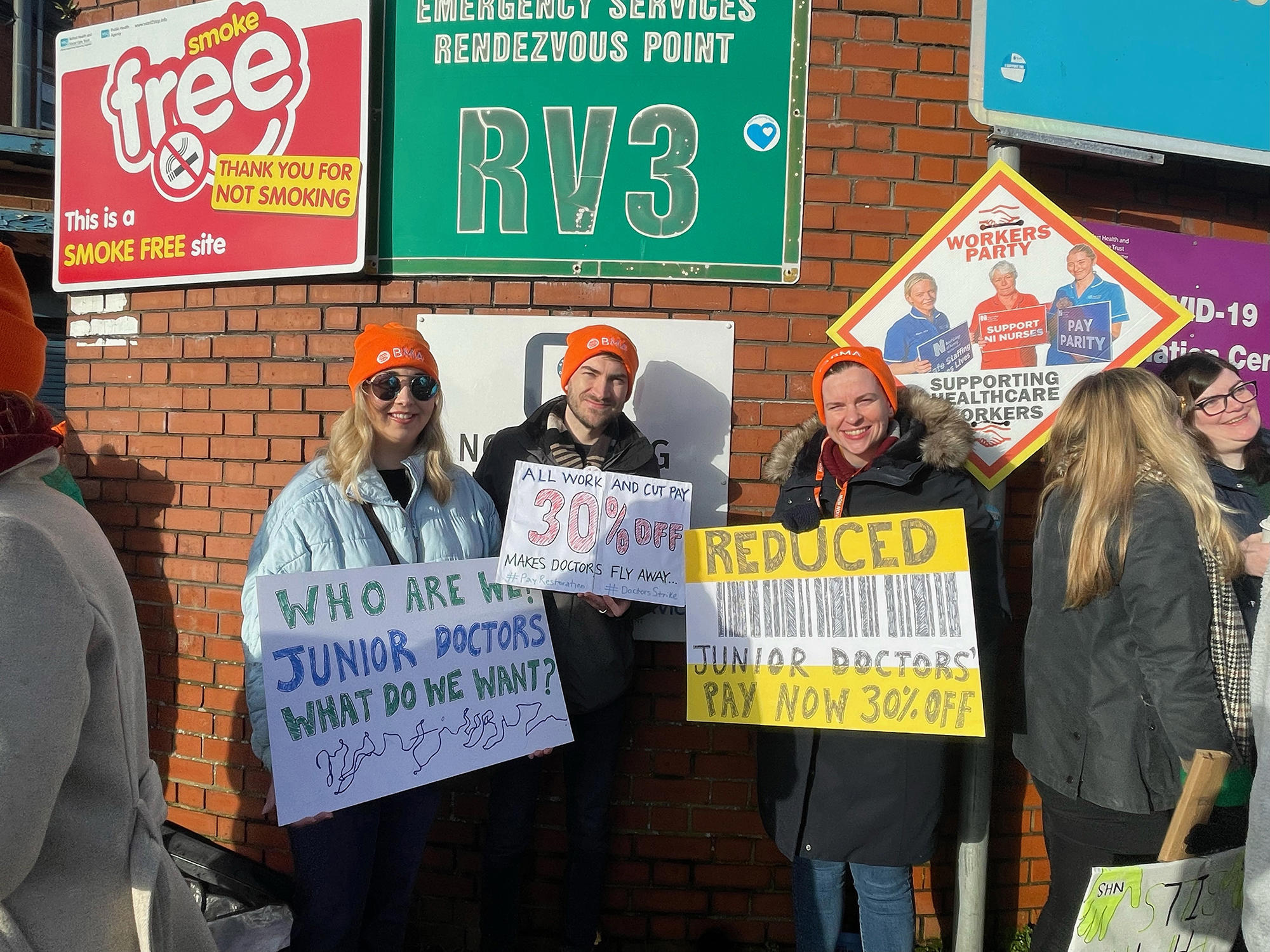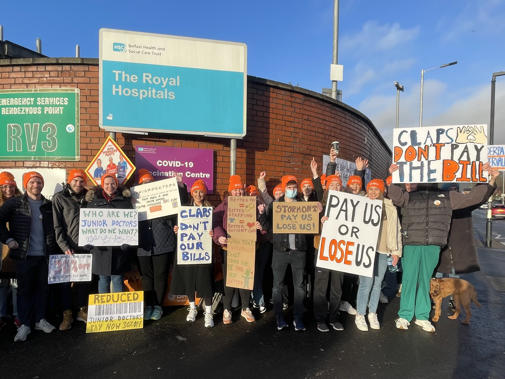It is hard to have a pay dispute when there has not a devolved government to argue with, while at the same time government in Westminster insists your dispute is a devolved issue.
Yet this has been the case for junior doctors in Northern Ireland.
Even since last month, when the Northern Ireland executive was reformed after two years of stalemate, they have been told the devolved government’s hands are tied until Westminster comes to an agreement with junior doctors in England.
Earning as little as £13 an hour, the lowest rate in the UK, BMA members in Northern Ireland had to act.
From 8am 6 March, about 2,000 junior doctors walked out on strike for 24 hours as they call for restoration of pay to 2008 levels in real terms, with an above-inflation uplift this year to stem the immediate workforce crisis.
Historic losses
While new health minister Robin Swann has agreed to match the 6 per cent and one-off lump sum pay uplift given to junior doctors in England – which will come into effect in April – this does little to address the real-terms losses of 30 per cent junior doctors in Northern Ireland have faced since 2008.
Throughout a year, a foundation year 1 doctor in Northern Ireland earns £5,000 less in basic pay than someone in the same role in England. Basic pay is lower even than in Wales, where junior doctors have a similar dispute with their devolved government.
‘It’s been frustrating,’ says Northern Ireland junior doctors committee chair Fiona Griffin. ‘We had to get the ball rolling. At some stage someone had to listen to us. We couldn’t leave it until our pay had eroded by 50 per cent.
‘We are glad that we have an executive back, we live here as well, but it’s very frustrating they can’t negotiate until England has a deal. It’s contrary to what we’ve been told.
‘We’ve tried to talk with Chris Heaton-Harris [secretary of state for Northern Ireland] and he says health is a devolved issue.
‘We get that the position the [devolved] government is in is difficult but it is a political decision not to offer us a pay uplift. They are saying that they don’t want to cut public services, but they are essentially also saying that they are happy to cut doctors.’
Apathy to action
Dr Griffin said the collapsed Northern Ireland executive in the last two years had added to a pre-existing ‘apathy’ among doctors who had lost faith in the political system. It meant the BMA in Northern Ireland had to ‘work really hard’ to campaign for pay restoration against that backdrop.
However, the 97.6 per cent vote in favour of industrial action from BMA Northern Ireland junior doctor committee members shows how that apathy has transformed into action through on-the-ground campaigning, said Dr Griffin: ‘We needed to do something, even though we didn’t have a government.’
Mr Swann had said initiating pay negotiations was his ‘immediate priority’ when he took office but has since said mirroring the offer in England is at ‘the very limit of what can be afforded at this juncture’.
Mr Swann, now using the language of ‘damage limitation’, has said the dispute is national, so a solution ‘will have to come at the national level’.
But this was rubbished by doctors demonstrating outside Belfast’s Royal Victoria Hospital who pointed to the offer made by the Scottish government (and accepted by junior doctors in Scotland) promised to restore pay over the long term.
Marcus Hollyer, an internal medicine trainee 2 in Belfast, said: ‘Scotland were able to negotiate an offer that their members accepted. They didn’t go on strike. That represents an effective relationship with their devolved government.
‘We aren’t worth 30 per cent less than doctors were in 2008, or less than our colleagues in the rest of the UK – or the Republic of Ireland.’
Doctors in Northern Ireland are not just being tempted to move to far-flung destinations such as Australia and New Zealand, but to better-paid roles in the Republic of Ireland.
‘A lot of people live here and work over the border,’ explained Dr Hollyer. ‘They also have challenges with their working conditions, but they are significantly better remunerated for that work.
‘It shows we are a highly-skilled, highly-educated workforce that is currently under-valued.’
 HOLLYER: 'We aren't worth 30 per cent less'
HOLLYER: 'We aren't worth 30 per cent less'
The cycle is vicious, and self-perpetuating. Poor pay leads to short-staffing, and under-staffed hospitals lead to longer waits and poorer outcomes for patients. More doctors leave as a result, and problems get worse.
NIJDC is also urging hospital trusts to commit to complying with the BMA fatigue and facilities charter, with a focus on urgent introduction of safe working limits to fix rotas.
This comes after GMC survey results found 49 per cent of trainees in Northern Ireland reported working above their rostered hours – higher than the UK average of 42 per cent – and a higher proportion (38 per cent) reporting rota gaps than in the UK (28 per cent).
Doctors demonstrating at Royal Victoria Hospital explained how conditions are affecting their morale and wellbeing – and that they have concerns about the level of care the system allows them to provide.
Foundation year one Ross Brown said: ‘It’s hard enough to recruit to Northern Ireland anyway, and the low pay makes it even worse.
‘Rota gaps have become permanent gaps. There’s a permanent staffing shortage, it’s the new normal. If someone else is off sick, you are left doing the work of two doctors. It’s not sustainable, and more and more people are leaving. We don’t feel like we’re giving the care we want to give.’
Best outcome
Fellow foundation year one Emily Snowden agreed: ‘Some days all we can do is keep people safe. You are just trying to put out one fire and move on to the next thing.’
Denise McKeegan, a specialty trainee 7 explained the ‘huge changes’ she has witnessed since becoming a junior doctor in 2013.
‘We didn’t used to have hundreds of patients in corridors. That’s not why I signed up to become a doctor. I feel like I’m always apologising to people because we’re always giving people substandard care. You never get on top of things. You’re not even putting fires out, you’re just dampening them.
‘If you pay people properly they will stay. If they have better conditions, they will stay. But if you don’t they will move for better conditions and quality of life elsewhere.’
Molly Keenan, a specialty trainee 1, said: ‘We just feel undervalued. It’s really hard to repeat this day after day. We spend our whole time apologising to patients for something that is out of our control – that can be traumatising.
‘What do you say to a patient who has been waiting for 24 hours?’
Specialty trainee 5 Orla Devlan said colleagues are voting with their feet as a result of the conditions. ‘We are constantly working with rota gaps,’ she said. ‘People choose to leave training entirely or work less than full-time [for their mental health].’
 SOLIDARITY: Drs Devlan, Irvine and McGonagle
SOLIDARITY: Drs Devlan, Irvine and McGonagle
Ross Irvine, a specialty trainee 6, pointed out that conditions have led to the highest rates of burnout among trainers and trainees in Northern Ireland, according to GMC data.
Ruth McGonagle, a specialty trainee 5, is saving up for her wedding, but says it would be impossible without picking up extra locum shifts.
‘That’s not what anyone thought when they signed up to become a doctor,’ she said. ‘We do this job because we want to help people but we all thought it would be a good salary. It doesn’t feel like what we signed up to.’
Dr Griffin says the situation – of hospitals at breaking point, staff burnt out and watching their colleagues leave for better pay and conditions elsewhere – has forced doctors in Northern Ireland into action when they have historically been ‘resistant to change’.
‘Let’s not wait until things are in absolute crisis mode until we act – which is more expensive anyway,’ she said. ‘Let’s make positive choices now.’
This initial 24-hour walkout could be followed by longer strike action if the devolved government does not produce an offer that the NIJDC feels it can take to its members.
‘It’s a big move that it’s come to this,’ says Dr Griffin. ‘No doctor wants to go on strike. Doctors used to be adequately paid for the work that they do, but everyone is feeling the squeeze now.
‘The social contract has been broken.’
(image credits: Ben Ireland/BMA)

